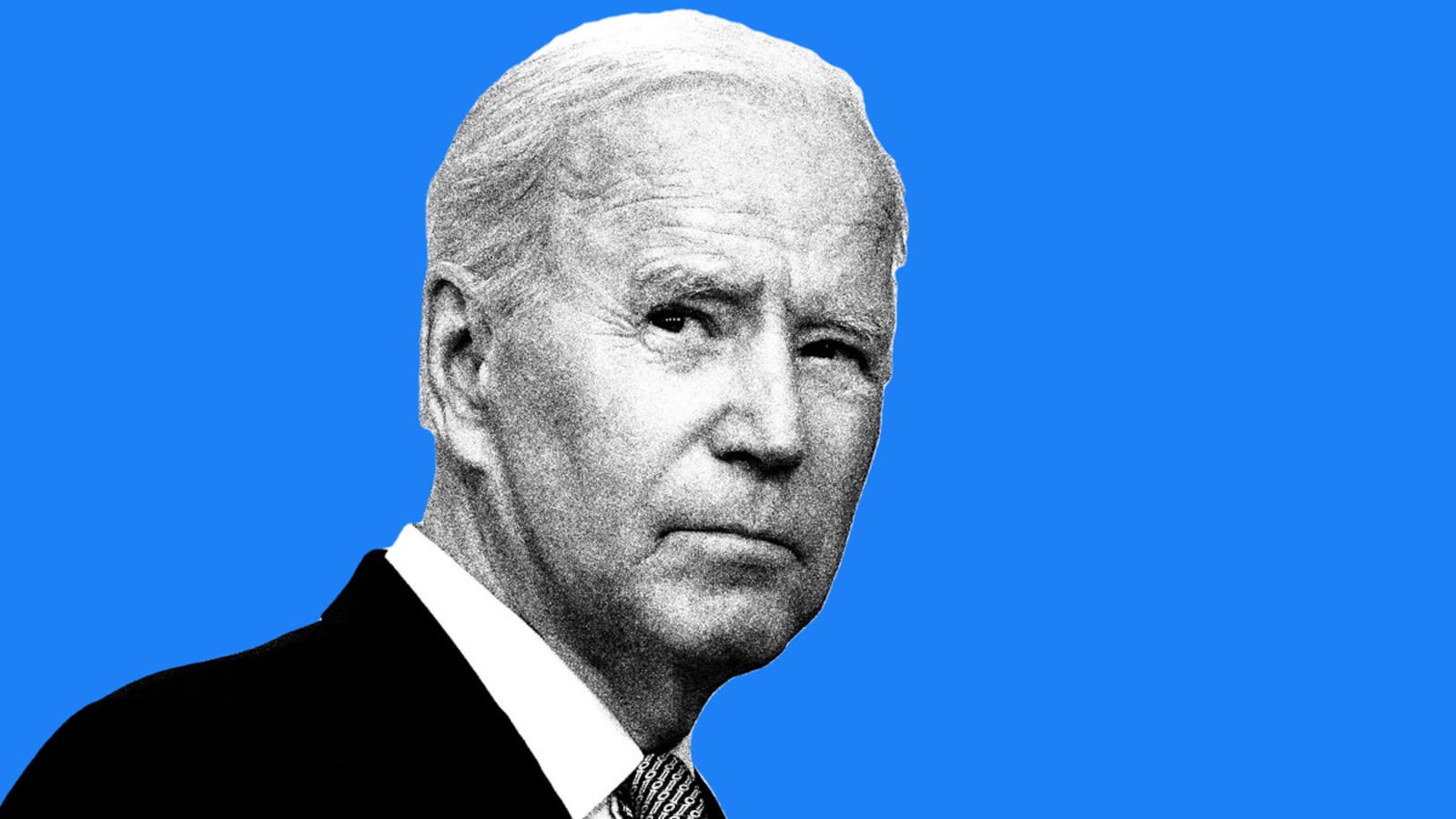Israel has finally agreed to a cease-fire, but this month’s violence has sparked a standoff between congressional liberals and President Joe Biden that is just getting started.
On Thursday, after an 11-day military campaign, the Israeli Security Cabinet approved a cease-fire after increasing pressure from the international community and, eventually, Biden.
But Biden didn’t start out there. At the beginning of the week, the president made it clear he wasn’t calling for a cease-fire so much as saying he’d support one, if Israel reached that decision. Biden blocked a United Nations Security Council resolution three times calling for a cease-fire, and he repeatedly said he supports Israel’s “right to defend itself.”
When White House press secretary Jen Psaki was asked about some of the criticism the administration has fielded from lawmakers like Rep. Alexandria Ocasio-Cortez (D-NY), Psaki was emphatic that political pressure from progressives wouldn’t affect Biden’s decision-making.
“The president doesn't see this through the prism of domestic politics,” Psaki said.
Perhaps not. But Biden’s support for Israeli Prime Minister Benjamin Netanyahu’s government has put a number of Biden’s Democratic allies in an awkward position. They want to support the president. But many progressives are increasingly uncomfortable with the new administration’s accommodation of Israel’s more bellicose tendencies—and the latest burst of conflict, these lawmakers say, has opened up space for them to reexamine all the ways in which Congress has backed Israel.
“There is more and more interest in conditioning aid to Israel, given what's been happening,” Rep. Pramila Jayapal (D-WA), chair of the Congressional Progressive Caucus, told The Daily Beast on Wednesday. “Whether or not that happens this year, that would be a tectonic shift right now.”
“This is a serious crisis, and I think the President had an opportunity to reset the dial from the last administration's relationship with Israel,” Jayapal continued, labeling Biden’s decision to block United Nations Security Council calls for a cease-fire “unacceptable.”
Over the course of the week, Biden did get sterner with Israel, as the country continued its bombing campaign of Palestinian territories. By Wednesday, Biden finally did call for a cease-fire. But by the time Israel finally announced an end to its missile strikes, more than 200 Palestinians were dead, including 63 children, according to the Palestinian Health Ministry, and 58,000 Palestinians had been displaced. Meanwhile, 12 Israelis have died from Hamas missile attacks and civil unrest.
Jayapal, for one, was unimpressed with Biden’s changing tone, telling The Daily Beast that Biden’s eventual decision to call for a cease-fire was “too little, too late.”
That kind of talk has been rare in recent decades, when a consensus of automatic support for Israel dominated the Democratic Party. The fact that this dialogue is happening now reflects a leftward shift within the party on Israel—and a rightward shift within Israel that has alienated many Democrats. Netanyahu, for his part, has all but buried the idea of a two-state solution in the Middle East, and done all he could to elect Republican candidates in America. Meanwhile, movements like Black Lives Matter and leftwing stars like Bernie Sanders have helped push progressive sympathies toward the Palestinian side.
In the eyes of many on Capitol Hill, however, Biden has remained as loyal as ever to Israel. During his 36 years in the U.S. Senate, he forged close ties with Israeli leaders as the top Democrat on the Foreign Relations Committee. He’s called Netanyahu his friend for more than 30 years.
The president, one progressive aide told The Daily Beast, is seen as to the right of even the Senate’s two most pro-Israel Democrats—Majority Leader Chuck Schumer (D-NY) and Sen. Bob Menendez (D-NJ), the current chair of the Senate Foreign Relations Committee.
But thanks to the outrage over Israel’s actions—civilian casualties, leveled refugee camps, destroyed medical facilities—as well as the sense that Biden won’t act the way progressive lawmakers want without significant pressure, congressional Democrats are taking inventory of all the different ways they might use their power to shift U.S. policy.
One is funding—the key power that Congress retains. Traditionally, both parties have supported generous aid packages to Israel, and the notion of putting conditions on that aid has been a red line for most lawmakers. Even progressives haven’t dared cross that threshold.
But on Wednesday, before the cease-fire was announced, Rep. Mark Pocan (D-WI) said the old way of handling Israel wasn’t acceptable.
“We’ve got to start figuring out ways to put some pressure points,” said Pocan, a former chair of the Congressional Progressive Caucus. “And one of those is deciding whether or not the assistance that we give—if it continues to go there with no strings attached.”
The current chair of the CPC, Jayapal, was just as emphatic.
“Our main leverage is around the aid that we give, and our diplomatic relations,” Jayapal said. She added that greater support for conditioning U.S. aid to Israel would represent a massive shift in the party. And though she doesn’t yet see widespread movement to that policy, she does see some.
Jayapal was one of eight Democrats on Thursday who signed a letter to Biden calling for an indefinite hold on a $735 million arms sale to Israel.
“We have a special obligation to scrutinize the actions of our close ally Israel, given our provision of weaponry and other military and diplomatic support to the Israeli government,” these Democrats wrote in their letter to Biden, calling the sale “antithetical to any efforts to try and de-escalate violence.”
The arms sale became a flashpoint this week when news broke that the U.S. had approved the exchange to Israel and planned to move ahead with it despite the continued bombings. While lawmakers on the House Foreign Affairs Committee, which has jurisdiction over arms sales, do not have to be notified about these sorts of transactions, the chairman and ranking member of the committee do.
In this case, Foreign Affairs chairman Gregory Meeks (D-NY) wasn’t notified of the sale until it came out in the media. The deal was approved months ago, but became public during the tensest point of U.S.-Israel ties in recent years.
Liberal Democrats were outraged. Committee Democrats called an emergency meeting. And Meeks and Democrats on the panel decided to request that Biden delay the sale, according to Politico. Ultimately, Meeks backed down, saying he’d secured a classified briefing for members on the arms sale.
But in the wake of that dust-up, leaders have confirmed to rank-and-file members on the Foreign Affairs Committee that they, too, will be notified of U.S. arms sales, according to one aide, who described it as a small, but welcome, change.
Rep. Ro Khanna (D-CA), a leading progressive on the House Armed Services Committee, said that a goal of lawmakers should be expanded enforcement of arms control laws that require the U.S. to sell weapons only if used for legitimate self-defense.
“What I'm going to be pushing for, and I think others as well, is a broader enforcement of the Arms Export Control Act in all situations around the world where our aid is available, to make sure that none of it, to any country is being used knowingly to violate human rights,” Khanna said.
On Thursday, Sanders said he would introduce a resolution to block the U.S. arms sale to Israel, and a House companion was introduced on Wednesday by Pocan, Ocasio-Cortez, and Ilhan Omar (D-MN). The odds of success on that legislation, however, are long. Both chambers would need to vote to approve it, and then also override a likely veto from Biden—all in the brief timeframe that is required when it comes to disapproval of weapons deals. But the resolutions ensure that the arms sale will remain front-and-center in the dialogue, even after the cease-fire.
The public relations campaign illustrates the biggest power progressive lawmakers may have in this debate—the bully pulpit.
This week, many liberal lawmakers became convinced that their rafts of letters and comments, both public and private, had pushed Biden toward a tougher line on Israel, even if it was still far from what they wanted.
“He's listening,” Khanna said of Biden.
Khanna brought up Biden’s impromptu and emotional exchange this week in Michigan with Rep. Rashida Tlaib (D-MI), a member of Congress of Palestinian descent. “Who knows what makes someone decide something,” Khanna said, “but I think it's having an impact.”
And liberals are convinced that the changing politics of Israel within their party, combined with their advocacy, will have a measurable impact on Biden.
“It is very clear that the political environment and debate about the Middle East here in the United States has shifted since Joe Biden was elected to the U.S. Senate in 1972,” Rep. Gerry Connolly (D-VA), a senior member of the Foreign Affairs Committee, told The Daily Beast. “Those shifting dynamics are going to continue to be felt in the ensuing months and years.”
There are, of course, still a number of influential pro-Israel Democrats in the traditional mold. And they hold sway, even if progressives have defined the debate and key leaders have had to change their rhetoric.
One of those Democrats, Rep. Debbie Wasserman Schultz (D-FL), told Jewish Insider that it’s a “small group of loud voices” who were pressuring Biden, and that “the overwhelming majority of Democrats in the nation, and Democrats in Congress, are strongly supportive of Israel, of the U.S.-Israel relationship, of Israel remaining a Jewish and Democratic state.”
This supposed silent majority may exist within the Democratic caucus, but even if it’s less robust than Wasserman Schultz asserts, the inertia of U.S. policy toward Israel may still mean that nothing changes.
Take the issue of Iron Dome—the U.S-funded missile defense system that intercepted so many of the rockets fired into Israel over the past two weeks. Even Pocan said he has “always supported the Iron Dome… because the idea is when a missile comes in, if you take it out, no one’s been killed on either side and there's de-escalation. If you use it for that purpose, and then you still send 20 times the number of missiles back, that’s not the intention.”
House Armed Services Chairman Adam Smith (D-WA) acknowledged to The Daily Beast that there wasn’t a whole lot members of Congress could do to move Israel policy—at least not immediately.
Smith oversees the sprawling defense authorization bill which sets Pentagon policies for the year. Iron Dome is always a hot-button issue. And judging by a procedural vote Republicans forced on Thursday, the political ramifications are only going to get more heated.
As the House voted on an emergency supplemental for increased security after Jan. 6, Republicans introduced an amendment that would have made an additional $500 million available to Israel for the Iron Dome and various ballistic missile programs.
A senior GOP aide predicted to The Daily Beast on Thursday that the House may soon vote on similar legislation, potentially even during the upcoming three-week recess, as a concession to Israel agreeing to a cease-fire.
As this aide said, “cease-fires aren’t cheap.”








